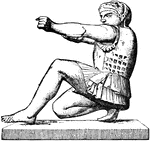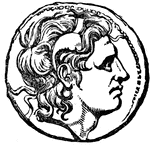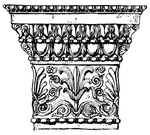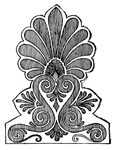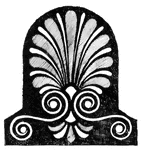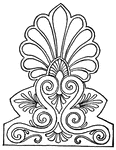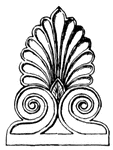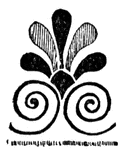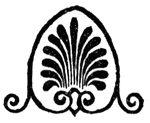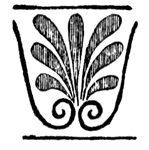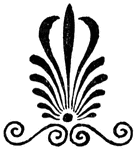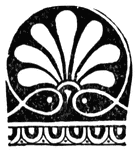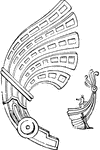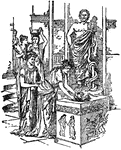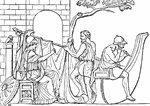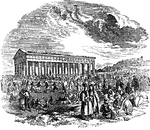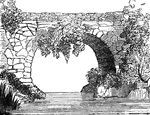
Accubation
"The act of lying or reclining; specifically, the ancient practice, derived from the Orient, of eating…
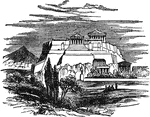
Acropolis
"Acropolis, 'the highest point of the city.' Many of the important cities of Greece and Asia Minor were…

Aeschines
"Aeschines owes the perpetuity of his fame to the fact he was the only rival of Demosthenes. He was…
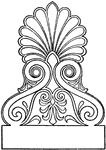
Greek Akroter
The Greek akroter serves as an ornamental finish to the apex of a gable. It is painted in the temple…
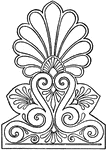
Greek Akroter
This Greek akroter is painted in Acropolis, Athens. It serves as the ornamental finish to the apex of…

Alcaeus
"Besides Sappho, her friend, perhaps lover, Alcaeus is almost the sole representative of the Aeolic…
!["The first noted public appearance of [Alcibiades] was on the occasion of the coming of the Lacedaemonian ambassadors requesting the surrender of Pylus. He at first violently opposed the petition, and even went so far as to urge the sending of an embassy to Argos to solicit that city to become a member in a new Athenian league. In spite of the earnest efforts of Nicias and of the protests of the Spartan ambassador, Alcibiades, by means of intrigue and bluster, succeeded in this work, and not only Argos, but also Elis and Mantinea, agreed to maintain an alliance with Athens for a hundred years."—Ridpath, 1885](https://etc.usf.edu/clipart/78900/78918/78918_alcibiades_mth.gif)
Alcibiades
"The first noted public appearance of [Alcibiades] was on the occasion of the coming of the Lacedaemonian…
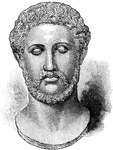
Alcibiades
A prominent Athenian statesman and member of the aristocratic family of the Alcmaeonidae.

Coin of Alexander the Great
"Coin of Alexander the Great. Alexander, at the time of his father's death, was in his twentieth year,…

Anacreon
"Though Anacreon has been famous as the poet of wine and love, few geniune fragments of his songs have…
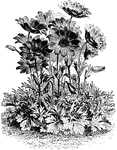
Anemone Fulgens Flower
The anemone fulgens flower is a dazzling scarlet color with a black central patch of stamens. This flower…

Tripod of Apollo
"It was the universal practice of the Greeks to undertake no matter of importance without first asking…

Apoxyomenos
An ancient sculpture representing an athlete using a strigil to scrape sweat and dust off his body.
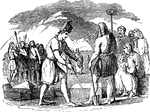
Founding of Argos
"Navigation for the purpose of commerce, and the art of writing, are said to have originated with the…

Aristophanes
A stature of Aristophanes, who was a prolific and commonly celebrated playwright of comedy. He is also…
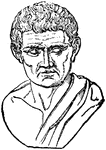
Aristotle
"Aristotle was born in 384 B.C., at Stagira, a seaport town of Chalcidice, whence he is frequeently…

Bust of Aspasia
"Pericles, after divorcing a wife with whom he had lived unhappily, took his mistress Aspasia to his…

Mourning Athena
"A tablet of Pentelic marble. Athena, leaning on her spear, is gazing with downcast head at a grave…
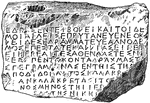
An Athenian Inscription
"A decree of the Council and Assembly dating from about 450 B.C."—Webster, 1913

Ancient Athens
"The mosted noted of the orations of Isocrates is the Panathenaicus or Panegyric of Athens, a work on…
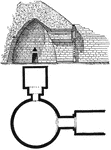
Treasury of Atreus
The Treasury of Atreus or Tomb of Agamemnon is an impressive "tholos" tomb at Mycenae, Greece (on the…

Treasury of Atreus Doorway
The Treasury of Atreus or Tomb of Agamemnon is an impressive "tholos" tomb at Mycenae, Greece (on the…
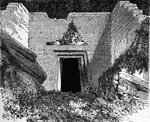
Tomb of Atreus
The Tomb of Atreus also known as the Treasury of Atreus is a tomb located in Mycenae, Greece built between…

Bias
Bias, one of the seven sages of Greece; a native of Priene, an Ionia; celebrated for his practical knowledge…
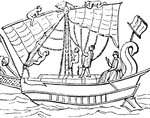
Greek Boat
"The masts were usually taken down when the vessel arrived in port, and raised again when it was about…
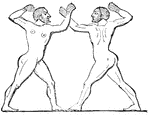
Boxing
"The Olympic games were of greater efficacy than the Amphictyonic Council in promoting the spirit of…

Curved buccina
"The buccina is curved for the convenience of the performer, with a very wide mouth, to diffuse…
